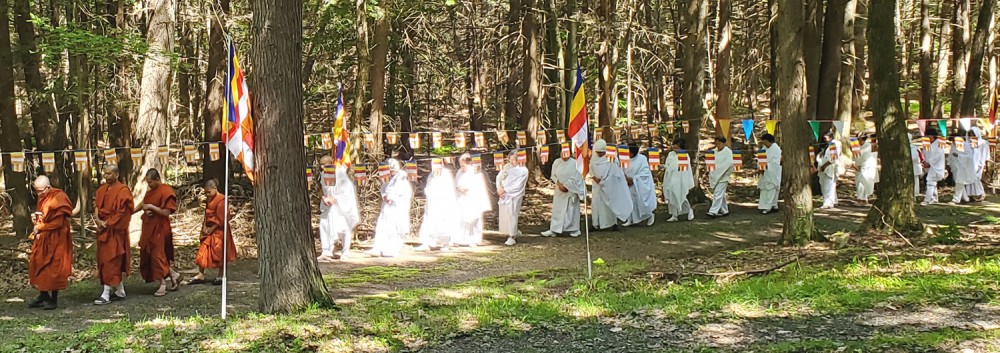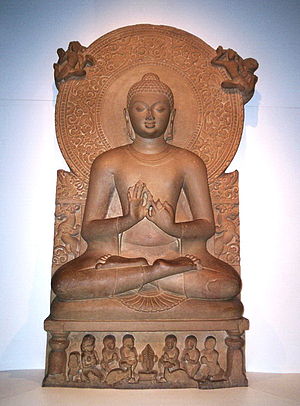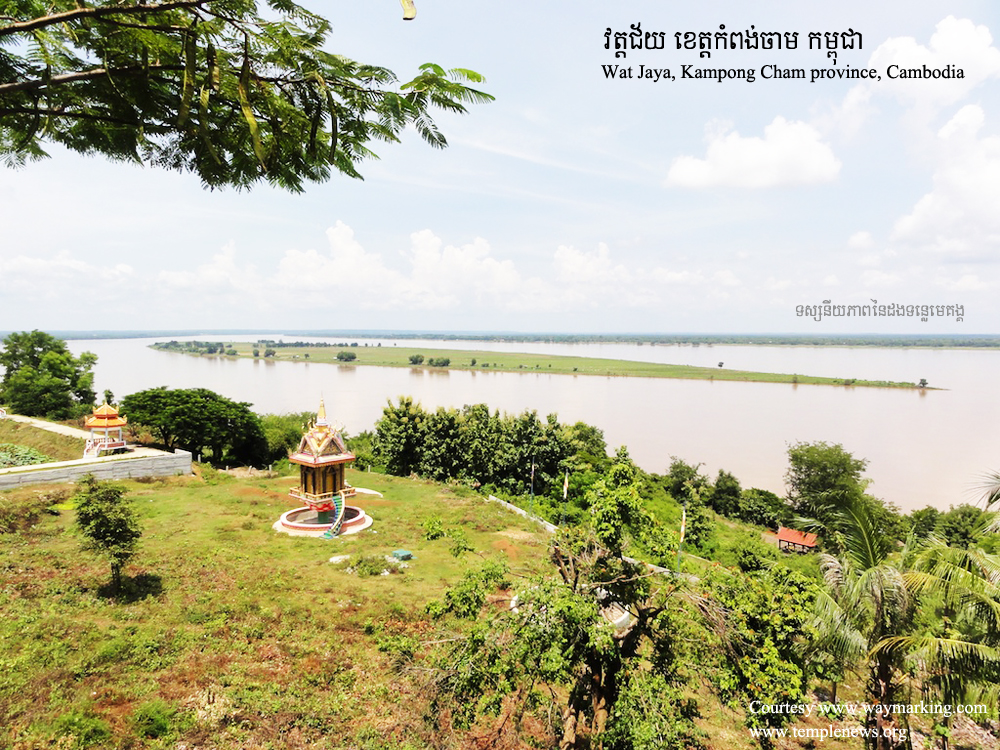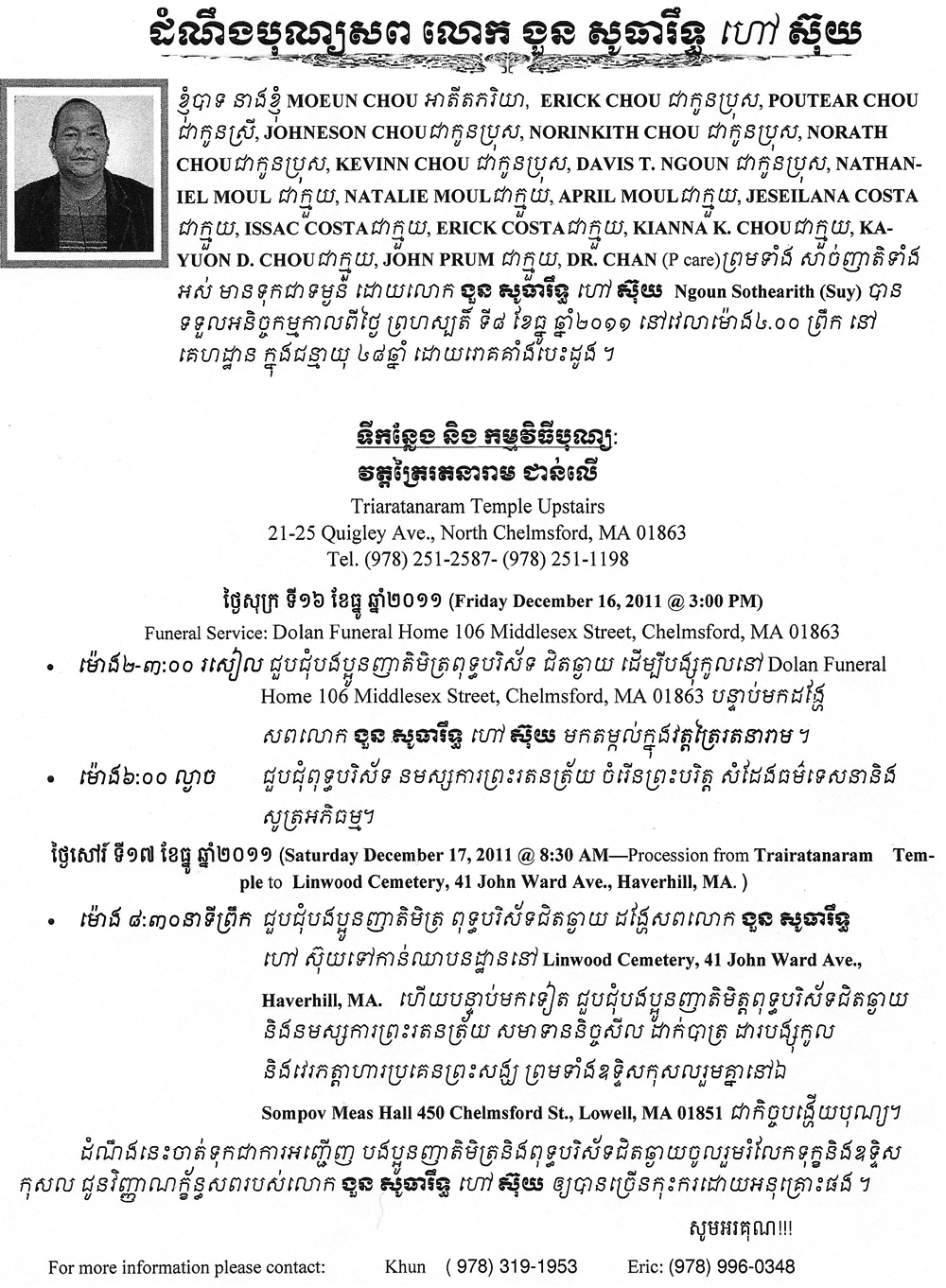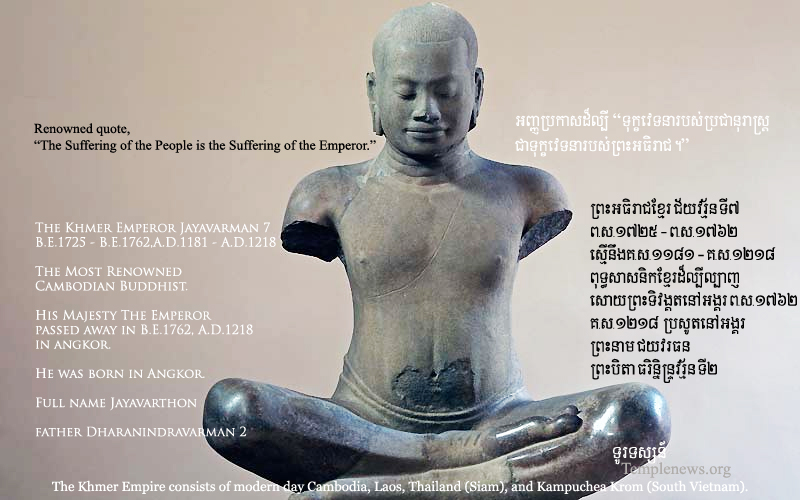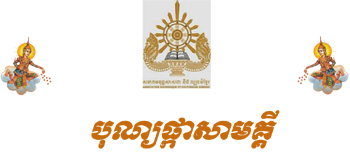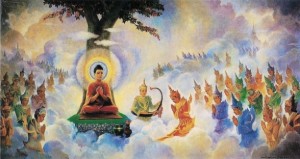The Nine Special Qualities of the Buddha
![]()
The Nine Special Qualities of the Buddha
By U Jota Lankra
That Blessed One is such since He is (1) Accomplished, (2) Perfectly Enlightened, (3) Endowed with knowledge and Conduct or Practice, (4) Well-gone or Well-spoken, (5) the Knower of worlds, (6) the Guide Unsurpassed of men to be tamed, (7) the Teacher of gods and men, (8) Enlightened, and (9) Blessed.
(1) The Accomplished One (Arahan)
According to Visuddhimagga-Atthakatha, Arahan (Accomplished) has five definitions. The Blessed One is accomplished for the following reasons: 1. because He is far away from all internal conflicts (Arahan), 2-3. because He destroyed the defilement — enemies and all the wheel’s spokes (Arahan), 4. because He is worthy of requisites (Arahan), and 5. because He is devoid of secret evil-doing (Arahan). (The beginningless round of rebirths is called the wheel of the round of rebirths.)
(2) The Perfectly Enlightened One (Sammasambuddho)
The Lord Buddha is the Perfectly Enlightened One because He has known all things rightly by Himself. In fact, He has of Himself known all the things, knowable things as knowable, comprehensible things as comprehensible, removable things as removable, realizable things as realizable,and things that may be developed as such.
(3) The Endowed One with Knowledge and Conduct ( Vijjacaranaasampanno)
The Lord Buddha is One who is endowed with three or eight kinds of knowledge and fifteen kinds of conduct.
“Vijja” means (higher) knowledge and “Carana”, good conduct (practice) that guides to a noble disciple and sends him towards the deathless.
There are “Three Kinds of Knowledge”
1. The knowledge that the Buddha recollects His past lives,
2. The knowledge capable of seeing the decease and rebirth of beings, and
3. The knowledge capable of eradicating defilements.
There are “Eight Kinds of Knowledge”
1. The knowledge or ability of attaining insight (With this knowledge, He knows, “my body is material, made from four great elements, born of mother and father, fed on rice and gruel, impermanent, liable to be injured and abraded, broken and destroyed, and this is my consciousness which is bound to it and dependent on it.”),
2. The knowledge of the production of a mind-made body, or the supernormal power of the mind-made body (With this knowledge, out of this body He produces another body, having a form, mind-made, complete in all its limbs and faculities.),
3. The various supernormal powers (With the super-normal powers, being one, He becomes many, and being many, He becomes one; He appears and disappears; He passes through fences, walls, and mountains unhindered as if through air; He sinks into the ground and emerges from it as if it were water; He walks on the water without breaking the surface as if on land; He flies cross-legged through the air like a bird with wings; He even touches and strokes with His hand the sun and moon, mighty and powerful as they are, and He travels in the body as far as the Brahma world.),
4. The divine ear (With the divine ear, He hears sounds both divine and human, whether far or near.),
5. The knowledge of others’ minds [understanding the ways of others’ thought] (With this knowledge, He knows and distinguishes with His mind the minds of other beings.),
6. The knowledge of previous existences [the remembrance of one’s former states of existence] (With this knowledge, He remembers many previous existences: one birth, two births,. . . . a hundred thusand births etc.),
7. The divine eye or the knowledge of the passing-away and arising of beings (With this divine eye, He sees beings passing-away and arising, inferior and superior, well-favored and ill-favored, to happy and unhappy destinations as kamma directs them.), and
8. The knowledge of eradicating defilements (With mind concentrated, purified and cleansed, unblemished, free from impurities, malleable, workable, established and having gained imperturability, He applies and directs his mind to the knowledge of eradicating defilements or destruction of corruptions. With this knowledge, He knows as it really is: “This is suffering, the origing of suffering, the cessation of suffering, and the path leading to the cessation of suffering.) (Dighanikaya, Vol.1,Samathaphala Sutta)
The Fifteen kinds of the Good Conducts are as follows:
1. Restraint by virtue (moral restraint),
2. Guarding the doors of the sense faculties (Watching over the sense-doors),
3. Moderation in eating,
4. Watchfulness,
5. Faith,
6. Shame of wrong-doing,
7. Fear of wrong-doing,
8. Great learning,
9. Energy,
10. Mindfulness,
11. Wisdom, and
12-15. Four Jhanas of the fine material sphere.
( 4) The Well-gone One or The Well-spoken One ( Sugata)
The term “Sugata” has two definitions:
1. One who has gone to the deathless, Nibbana and
2. One who speaks rightly, (It means that the Lord Buddha speaks only fitting speech in the fitting place).
The Six kinds of Speech
The Six Kinds of Speech are as follows:
1. The first one which is untrue, incorrect, and unbeneficial, and unwelcome and disagreeable to others,
2. The second which is true and correct, but unbeneficial, and unwelcome and disagreeable to others,
3. The third which is true, correct, and beneficial, but unwelcome and disagreeable to others,
4. The fourth which is untrue, incorrect, and unbeneficial, but welcome and agreeable to others,
5. The fifth which is true and correct but unbeneficial, and welcome and agreeable to others, and
6. The sixth which is true and correct, and beneficial, and welcome and agreeable to others.
Of them, only the third and sixth are the two kinds of speech that the Lord Buddha speaks because those are true, correct, and beneficial. (Majjhi-manikaya, Vol. 2, Abhayaraja-kumara Sutta)
(5) The Knower of the Worlds ( Lokavidu)
The Buddha is the Knower of Worlds because He has known the world in all ways.
There are Three Kinds of World:
1.The world of formations (Sankaraloka),
2. The world of beings (Sattaloka),
3. The world of location (Okasaloka).
(6) The Incomparable Leader of men to be Tamed (Anuttaro purisadammasarathi)
The Buddha surpasses the whole world in the special qualities of virtue, concentration, understanding, deliverance, and knowledge and vision of deliverance, so He is the Incomparable Leader (Master) of men to be tamed.
(7) The Teacher of Celestial and Human Beings (Sattha devamanussanan)
It is usual for religious masters to seek advice or teaching from the deities or gods, but this would never happen in the case of the Buddha. The deities are also beings caught in the round of rebirths because they could not find the way out of it. The Buddha did not seek counsel from human beings either, and relied solely on His knowledge of the Dhamma. On the other hand, deities and human beings merely come to Him for counsel or advice and teaching, thus He is the teacher of them.
(8) The Enlightened One (Buddho)
The Lord has discovered the Four Noble Truths by Himself and awakened others to them, thus He is enlightened.
The Four Noble Truths that He has discovered are:
(1) the truth of suffering,
(2) the truth of the cause of suffering,
(3) the truth of the cessation of suffering, and
(4) the truth of the way leading to the cessation of suffering.
(9) The Blessed One (Bhagava)
The Buddha is endowed with the six things:
(1) Lordship [Issariya],
(2) Doctrine [Dhamma],
(3) Fame [Yasa],
(4) Glory [Siri],
(5) Wish [Kama], and
(6) Endeavor [Payatta], thus He is called the Blessed One.
1). He has the supreme lordship over His own mind as follows:
i. Anima – power to make the body minute (e.g. making the size of an atom),
ii. Laghima – power to make the body light (e.g. walking on air),
iii. Mahima – power to make the body huge,
iv. Patti – power to arrive where He wants to go,
v. Pakamma – power to produce what He wants by resolving, etc.,
vi. Isita – power to make anyone or anything follow His wishes,
vii. Vasita – power to create at will water, fire, etc., and
viii. Yatthakamavasayita – power to attain the perfection in all ways in Him who wants to go through the air or do anything else of the sort.
2). He has the supramundane Dhamma.
3). He has the greatly pure fame, spread through the three worlds, attained through the quality of veracity.
4). He has the glory of all limbs, perfect in every appearance, which is capable of comforting the eyes of people eager to see His material body.
5). He has the wish i.e., accomplishment of whatever is wanted by Him whether it be for His own benefit or for another’s (others’).
6). And He has the endeavor, the right effort, which is the reason why the whole world reveres Him.
The Benefits of Recollecting the Special Qualities of the Buddha
As long as someone recollects the Buddha’s special qualities, his mind is not invaded either by greed, hate or delusion. His mind is quite upright with the Buddha as object. And by absence of the invasion of greed, etc., his mind faces the subject of meditation with rectitude; then his applied and sustained thoughts occur with a tendency towards the special qualities of the Buddha. When he continually practices the applied and sustained thoughts upon the Buddha’s special qualities, happiness arises in him. And then with his mind happy, his bodily disturbance and mental disturbance are tranquillized by tranquillity which has happiness as proximate cause. When they have been tranquillized, bodily bliss and mental bliss arise in him. When he is blissful, his mind, with the Buddha’s special qualities as its object, becomes concentrated, thus the Jhana factors eventually arise in a single moment. But because of the profundity of the Buddha’s special qualities, or because of being occupied in recollecting special qualities of many kinds, the Jhana is only access and does not reach absorption (Appana). In addition, when a monk recollects the Buddha’s special qualities, he is respectful and deferential towards the Buddha. He attains an abundance of faith, of mindfulness, of understanding, and of merit. He has much happiness and gladness. He overcomes fear and dread. He is also able to bear pain. He comes to feel as if he were living in the Buddha’s presence. And his body, when the recollection of the Buddha’s special qualities dwells in it, becomes as worthy of veneration as a shrine room. His mind tends towards the stage of the Buddhas. When he encounters an opportunity for transgression, he has awareness of conscience and shame as vivid as though he were face to face with the Buddha. Besides, if he penetrates no higher, he will be at least destined to be born in a happy state. (THE PATH OF PURIFICATION – VISUDDHIMAGGA, 229-230)
The Ten Wisdom-powers of the Buddha
The Ten Wisdom-powers of the Buddha are as followings:
1. Thanathanakosallanana= Understanding as it truly is the possible as possible and the impossible as impossible,
2. Kammavipaka nana = Understanding as it truly is the results of actions (kammas) undertaken, past, future, and present, with possibilities and with causes,
3. Sabbatthagamina patipada nana = Understanding as it truly is the ways leading to all destinations (all the states of existence and Nibbana),
4. Anekadhatu nanadhatu nanaa = Understanding as it truly is the world with its many and different elements,
5. Nanadhimuttikatanana = Understanding as it truly is how beings have different inclinations,
6.Indriyaparopariyattanana = Understanding as it truly is the disposition of the faculties of other beings, other persons,
7. Jhanadisankilitthavodanavutthananana = Understanding as it truly is the defilement, the cleansing and the emergence in regard to the Jhanas, liberations, concentrations, and attainments,
8.Pubbenivasanussatinanaa = Recollecting His mindfold past lives,
9.Cutupapatanana (Dibbacakkhunana )= (With the divine eye which is purified and surpasses the human, seeing beings passing away and reappearing, inferior and superior, fair and ugly, fortune and unfortune), Understanding how beings pass on according to their kammas, and
10. Esavakkhayanana = Realizing for Himself with direct knowledge, here and now entering upon and abiding in the deliverance of mind and deliverance by wisdom that are taintless with the destruction of the taints. (Majjhimanikaya, Mulapannasa, Mahasahanada Sutta)
Courtesy tbsa.org
Let lust and hatred fall away
![]()
As old flowers fall from a jasmine plant let lust and hatred fall away. v.377
Ajahn Chah was in London, staying at the Hampstead Vihara. The monks were troubled by the noise that was coming from the pub across the road. Ajahn Chah told them that the cause of suffering was their sending attention out to trouble the sound. Sound itself is just so. Suffering only arises when we ‘go out’ and add something extra. Seeing our part in creating problems, a shift in the way we view struggles takes place. Instead of blaming, we simply ‘see’ what we are doing, in the moment. Let’s not get into a fight with hatred; exercising careful restraint and wiAjahn Chahse reflection, we let ‘fall away’.
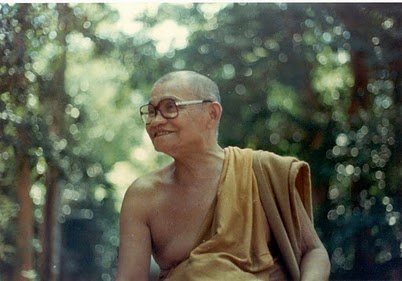
Initially we see this only after we have reacted and created suffering. With practice we catch it sooner. One day, we will catch ourselves just as we are about to create the problem. Ajahn Munindo Reflection.
Paying respect to The Triple Gems
Wat Ratanarangsey
Abbot The Maha Thera Pannapadipo Pat Sophal
75 Thornton Street
Revere, MA 02151
Phone: 781.286.1942
E-mail: patsophal75@yahoo.com
On YouTube: www.youtube.com/sophalpat
Poem: Khmer Nearly Lost
The Maha Thera Indapanno Ngin Phen, Wat Bodhivangsa, Paris, France and former Bishop of Phnom Penh Buddhist Administration before the communist eras.
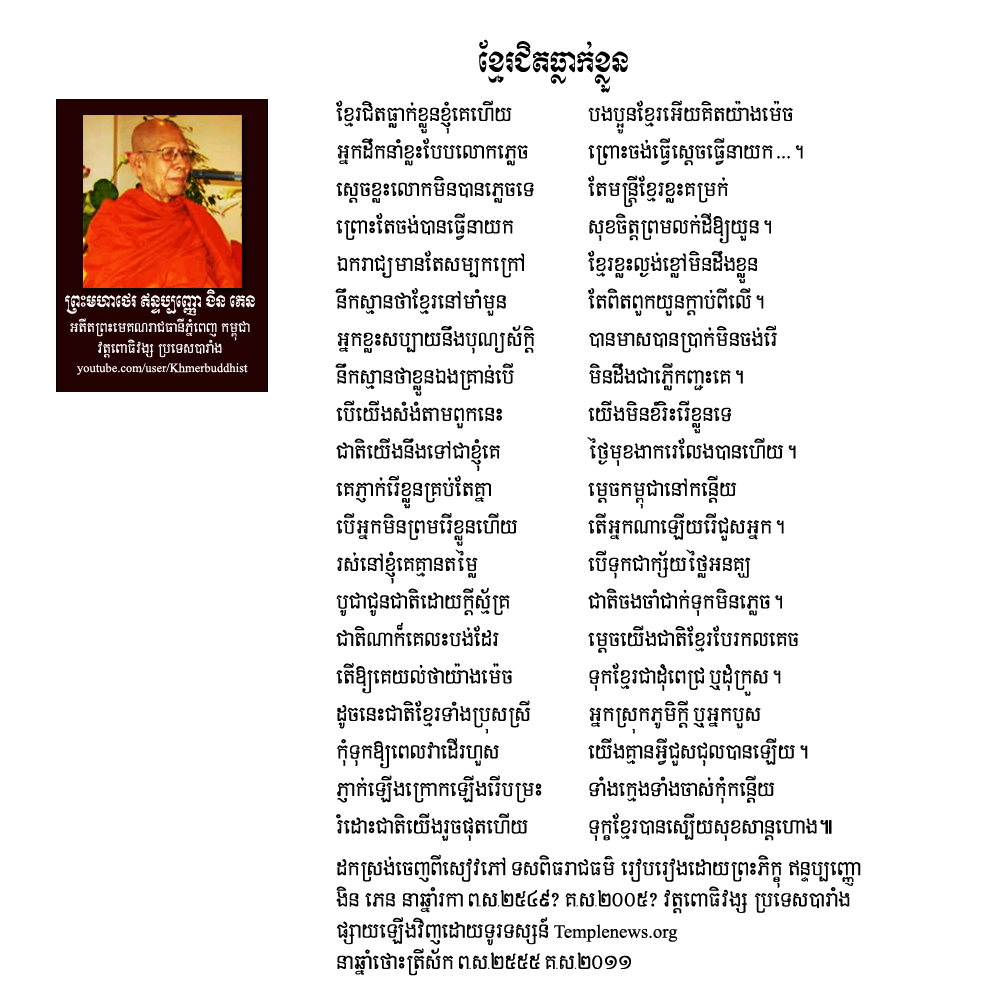
Poem in PDF poemMahaTheraIndapannoNginPhen
Obit: Ngoun Sothearith, age 48, passed away on Dec. 8, 2011 due to illness
Video: The Kathina Dana Ceremony at Wat Kirivongsa Bopharam

The 2555 United Kathina Dana Ceremony at Wat Kirivongsa Bopharam, the Peace Meditation Center, presided by the Maha Thera Siripanno Thon Sophon and Maha Thera Pannapadipo Pat Sophal. Watch video
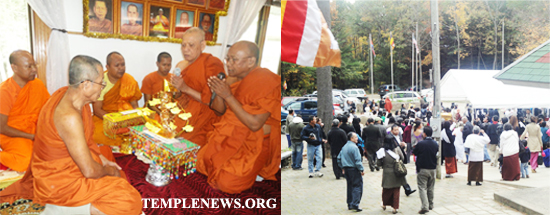
Ven. Dejapanno Phorn Pheap, Vipassana Master, former Vipassana Student of the late and renowned Cambodian Vipassana Master Ven. Ketodhammo Som Bunthoeun, and abbot of Wat Kirivongsa Bopharam receives the Kathina saffron robes.
Khmer-Pali-English Buddhist Dictionary
Khmer-Pali-English Buddhist Dictionary
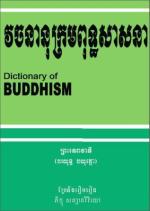
Click here to view the The Buddhist Dictionary
Courtesy KhmerBuddhism.com
Khmer Krom Buddhist Monks Association appeals to Ministry of Cult & Religious Affairs
The Khmer Kampuchea Krom Buddhist Monks Association, KKBM, appeals to the Cambodian Ministry of Cult & Religious Affairs to seek justice for the Venerable Chea Sovannaphumi, acting abbot of Wat Keo Muni Von, Mukh Kampoul district, Kandal province, Kingdom of Cambodia, so that he could return to his pagoda.
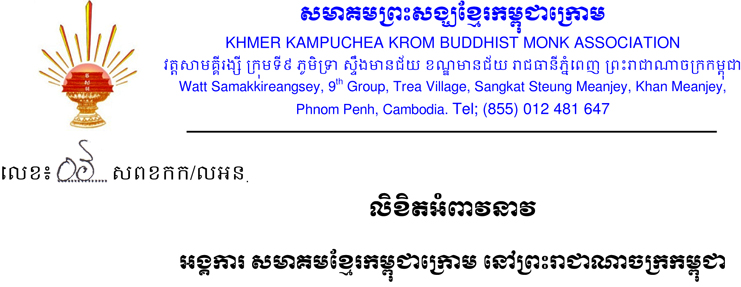
16-page Appeal Letter of the Khmer Kampuchea Krom Buddhist Monks Association based in the Kingdom of Cambodia to the Ministry of Cult & Religious Affairs: Ven.JeaSovannaphumi
The Most Renowned Cambodian Buddhist, Jayavarman 7
The Suffering of the People is the Suffering of the Emperor.
Map of the great Khmer Empire during the reign of Emperor Jayavarman 7. There were no Siam or Thailand, Laos and Vietnam. Only one vast country, Cambodia.
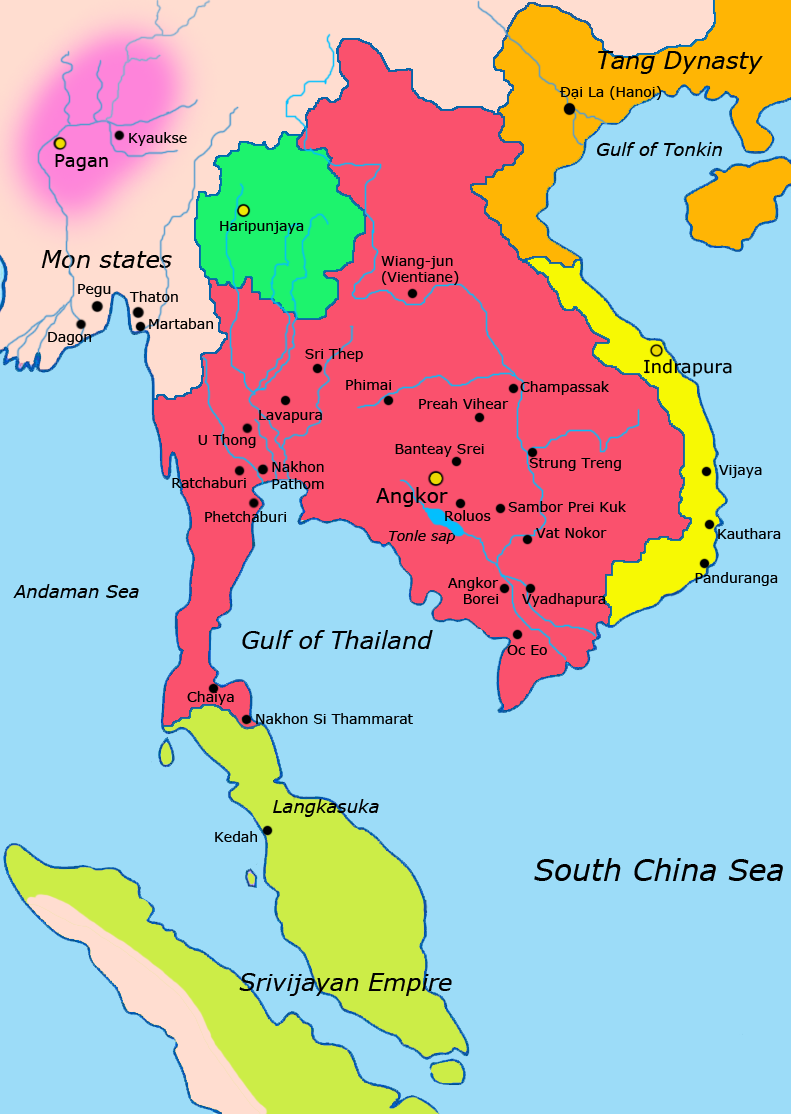
Map of Southeast Asia in year B.E.1444 or 900C.E. or A.D.
(Or 1,111 years ago).
Courtesy Wikipedia
Wat Ounalom

Wat Ounalom
Approximate age 568 as of B.E.2555, A.D.2011 Year of the Rabbit.
Built in B.E.1987, A.D.1443 in the reign of the Khmer king Borommaraja II or Chao Ponhea Yat (B.E.1937 – B.E.2007 equivalent to A.D.1393 – A.D.1463), the last ruler of the Khmer Empire, predecessor of modern day Cambodia.
Located near riverbank of the Tonle Sap river, Phnom Penh, Cambodia
Wat Krapom Chhouk Jraal Ja also known as Wat Ja
Wat Muni Sikkharam’s Fundraising Ceremony: Invitation
The Khmer Cultural and Buddhist Association, KCBA , has acquired a plot of 6,524 square meters (70,224 square feet) land located at 77860 Couilly Pont-aux-Dames to build a Khmer cultural center and pagoda on October 10, 2011 in France. The Buddhist Offering Ceremony to the Triple Gems was celebrated on Sunday October 30, 2011 that attended by a few hundred of our countrymen and faithfuls in this unique and historic event in a very brotherly and joyful atmosphere.
This site is officially dedicated to Wat Muni Sikkharam, our new Khmer pagoda for Couilly Pont-aux-Dames.
To support this project and provide for a new pagoda, we have an honor and pleasure to invite you to a great day of solidarity, A Buddhist Fundraising Ceremony, to be held on Sunday the 10th Waning Moon of Kattikā B.E.2555, November 20, A.D. 2011 Year of the Rabbit at 9:00AM at the following location:
Wat Muni Sikkharam
28 Rue Cyprien Borgnone
77860 Couilly Pont aux Dames
France
To download invitation in Khmer: http://abck.org/cariboost_files/bk4.pdf
To download invitation in French:http://abck.org/cariboost_files/bf4.pdf
Thank you in advance for your generosity and your loyalty to our religion and culture.
Festival Committee
Website: www.abck.org
How to take insult
Source: TheDailyEnlightenment.com Weekly
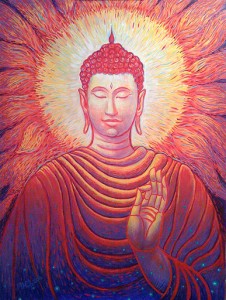 On one occasion, the Buddha was invited by the Brahmin Bharadvaja for alms to his house. As invited, the Buddha visited the house of the Brahmin. Instead of entertaining Him, the Brahmin poured forth a torrent of abuse with the filthiest of words. The Buddha politely inquired:
On one occasion, the Buddha was invited by the Brahmin Bharadvaja for alms to his house. As invited, the Buddha visited the house of the Brahmin. Instead of entertaining Him, the Brahmin poured forth a torrent of abuse with the filthiest of words. The Buddha politely inquired:
“Do visitors come to your house, good Brahmin?”
“Yes,” he replied.
“What do yu do when they come?”
“Oh, we prepare a sumptuous feast.”
“What do you if they refuse to receive the meal?”
“Why, we gladly partake of them ourselves.”
“Well, good Brahmin, you have invited me for alms and entertained me with abuse which I decline to accept. So now it belongs to you.”
From the Akkosa Sutta
The Buddha did not retaliate but politely gave back what the Brahmin had given Him. Retaliate not, the Buddha advised. “Hatred does not cease through hatred but through love alone they cease.”
Quotation: It is better to conquer yourself than to win a thousand
Wat Triratanaram

Abbot the Maha Thera Dhammathero Sao Khon
21 – 25 Quigley Avenue
North Chelmsford, MA 01863
Phones: 978.251.2587, 978.251.1198
Facsimile: 978.251.1198
Wat Glory

The Glory Buddhist Temple
Bhikkhu Aggadipo, Chief Monk, deceased
Bhikkhu Vijasampanno, Chief Monk, deceased
24 Cambridge Street
Lowell, Massachusetts 01851
Phone: 978.458.0498
វត្ដពន្លឺពុទ្ធចក្ក
វត្ដខ្មែរនៅរដ្ឋម៉ាសាឈូសិត្ដស៍ សហរដ្ឋអាមេរិក
Wat Khmer in Massachusetts.
Wat Ratanarangsey

Abbot The Maha Thera Pannapadipo
75 Thornton Street
Revere, MA 02151
Telephones: 781.484.7302, 781.286.1942
E-mail: sophalpat@yahoo.com
On YouTube: www.youtube.com/sophalpat
វត្ដរតនរង្សី
វត្ដខ្មែរនៅរដ្ឋម៉ាសាឈូសិត្ដស៍ សហរដ្ឋអាមេរិក
Wat Khmer in Massachusetts.
Wat Sanghikaram

វត្ដសង្ឃិការាម Wat Sanghikaram
The Maha Thera Siripanno
President of the International Community of Khmer Buddhist Monks Center, IKBM
and Abbot of Wat Sanghikaram
110 Chestnut Street
Lynn, MA 01902 – 2911
Telephones: 781.595.7907, 781.593.2117
វត្ដសង្ឃិការាម
វត្ដខ្មែរនៅរដ្ឋម៉ាសាឈូសិត្ដស៍ សហរដ្ឋអាមេរិក
Wat Khmer in Massachusetts.
MEDITATION DOCUMENTARIES
DHAMMA TALK BY VEN. KETODHAMMO
ព្រះធម្មទេសនាសំដែងដោយ ព្រះធម្មវិបស្សនា កេតុធម្មោ សំ ប៊ុនធឿន
Dhamma talk by the late and renowned Cambodian Vipassana Buddhist Master Ven. Ketodhammo Som Bunthoeun.
TEMPLENEWS TV SHOWS
Watch our shows on LTC – Channel 95
Broadcast hours | Fridays: 4 – 5 pm, 8 – 9 pm
Tuesdays 11 am - 12 pm
Email: templenewscast@yahoo.com
Phone: 978.853.9623
Website: templenews.org
Youtube: www.youtube.com/templenewstv
To find out more, including how to control cookies, see here: Cookie Policy
